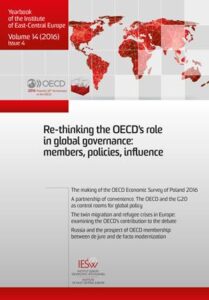ORCID: Marta Pachocka: 0000-0002-6930-5078
Pages: 71-99
Edition: Lublin 2016
DOI: --
Citation method: Pachocka, M. (2016) ‘The twin migration and refugee crises in Europe: examining the OECD’s contribution to the debate’, Yearbook of the Institute of East-Central Europe (Special Issue: Visvizi, A. (ed.) Re-thinking the OECD’s role in global governance: members, policies, influence), 14(4): 71-99.
Abstract:
In the light of the intensifying migration and refugee crises in Europe, various international stakeholders such as the UNHCR, the IOM and the EU have taken a stance in the debate. Among them, the OECD is the organization that stands out with its pragmatic policy-oriented approach rooted in its vast advisory experience, global outlook and socio-economic profile. A thorough examination of the OECD’s contribution to the debate on the crises leads to the conclusions that migrants coming to Europe in large numbers in recent years, most of whom are in need of international protection, create an opportunity for improvements in the areas of demographic and economic development in Europe. However, in order to make adequate use of their potential for their own and their host countries’ benefit, it is necessary that the European immigration and integration policies be revised and adapted to new political/legal conditions and economic circumstances.

PDF: Download